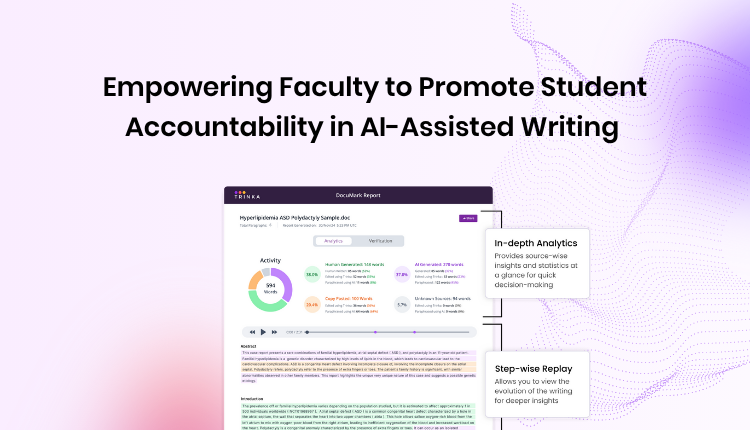Empowering Faculty to Promote Student Responsibility in AI-Assisted Writing

Academic integrity is a foundational principle in higher education—shaping not only academic work but also the ethical standards of future professionals. However, the emergence of generative AI tools like ChatGPT, Perplexity, DeepSeek, and various paraphrasing tools has made it more challenging to evaluate originality and student effort accurately. While these tools can support learning, misuse—such as unacknowledged AI assistance, factually incorrect content, or misrepresenting AI-generated material—undermines student responsibility and adds pressure on educators.
As AI use becomes more widespread, institutions are increasingly concerned about whether submitted assignments truly reflect a student’s understanding and effort.
Traditional plagiarism and AI detection tools are proving inadequate. They commonly fail to:
-
Accurately detect AI-generated content, leading to false positives or negatives
-
Identify instances of plagiarism or ghostwriting
-
Detect entire papers produced with generative AI
-
Provide insight into how a document was written—or who actually wrote it
What’s missing? Visibility and accountability.
To maintain academic integrity in the AI era, educators need tools that provide a transparent view of the student’s writing process.
Enter Trinka DocuMark
Trinka DocuMark is transforming how faculty engage with AI-supported submissions by shifting the emphasis from detection to deeper insight and learning outcomes. It offers a comprehensive view of the writing process by:
-
Tracking the full writing timeline—from initial drafts to final submissions
-
Detecting the degree of AI involvement, including AI-generated, human-written, and pasted content
By shedding light on how a student completed an assignment, DocuMark reinforces accountability, promotes ethical AI use, and reduces the burden on instructors.
Benefits for Faculty
-
DocuMark identifies whether content was typed, pasted, or AI-generated, providing a transparent view of how the submission was created—not just the final result.
-
Verified student reports eliminate ambiguity, helping faculty determine if students completed the work themselves.
-
Educators can confidently evaluate work without depending on unreliable AI detectors.
-
In the event of disputes, DocuMark offers a time-stamped, verifiable record to support fair and transparent resolution.
Benefits for Students
-
Students are encouraged to take full responsibility for their work, knowing the writing process is clearly documented.
-
DocuMark teaches students how to use AI tools ethically and effectively, building digital literacy for academic and professional contexts.
-
Fair and transparent reports protect students from being wrongly accused of misconduct due to flawed AI detection systems.
-
Verified writing processes lead to more consistent and equitable grading, especially for students with varying language backgrounds or writing styles.
-
By making their writing journey visible, students are motivated to revise thoughtfully and engage more deeply, rather than relying on AI-generated output.
AI is now a permanent part of education, but so is the responsibility to maintain academic honesty.
Trinka DocuMark offers a modern, balanced, and transparent approach to AI in academia. It empowers students to use AI responsibly while giving institutions the tools they need to ensure integrity.
It’s time for institutions to adopt intelligent, AI-aware solutions.
See Trinka DocuMark in action—schedule your demo today.




